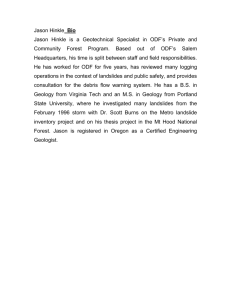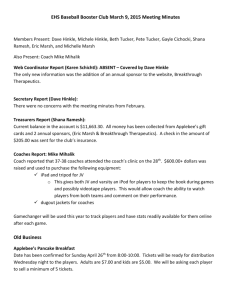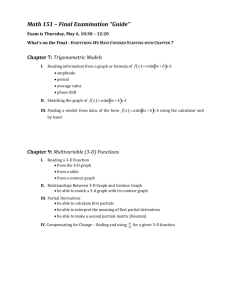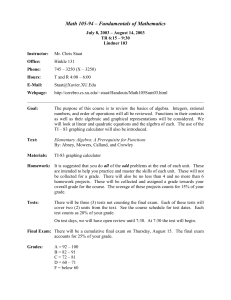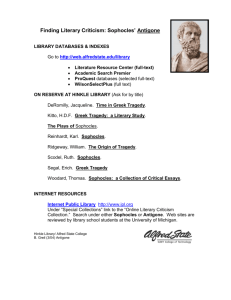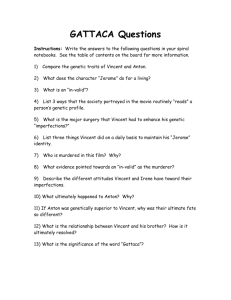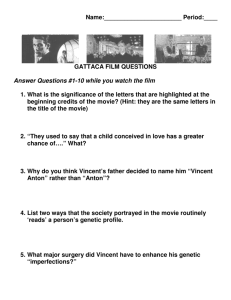Case Brief- Hinkle vs Wyoming
advertisement
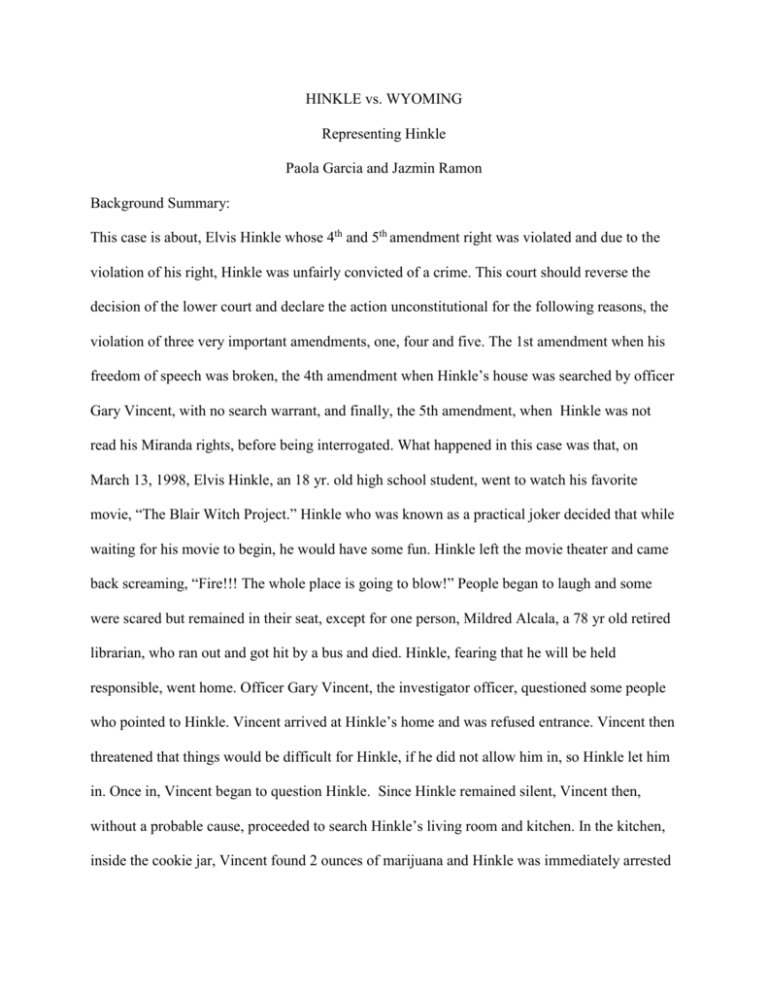
HINKLE vs. WYOMING Representing Hinkle Paola Garcia and Jazmin Ramon Background Summary: This case is about, Elvis Hinkle whose 4th and 5th amendment right was violated and due to the violation of his right, Hinkle was unfairly convicted of a crime. This court should reverse the decision of the lower court and declare the action unconstitutional for the following reasons, the violation of three very important amendments, one, four and five. The 1st amendment when his freedom of speech was broken, the 4th amendment when Hinkle’s house was searched by officer Gary Vincent, with no search warrant, and finally, the 5th amendment, when Hinkle was not read his Miranda rights, before being interrogated. What happened in this case was that, on March 13, 1998, Elvis Hinkle, an 18 yr. old high school student, went to watch his favorite movie, “The Blair Witch Project.” Hinkle who was known as a practical joker decided that while waiting for his movie to begin, he would have some fun. Hinkle left the movie theater and came back screaming, “Fire!!! The whole place is going to blow!” People began to laugh and some were scared but remained in their seat, except for one person, Mildred Alcala, a 78 yr old retired librarian, who ran out and got hit by a bus and died. Hinkle, fearing that he will be held responsible, went home. Officer Gary Vincent, the investigator officer, questioned some people who pointed to Hinkle. Vincent arrived at Hinkle’s home and was refused entrance. Vincent then threatened that things would be difficult for Hinkle, if he did not allow him in, so Hinkle let him in. Once in, Vincent began to question Hinkle. Since Hinkle remained silent, Vincent then, without a probable cause, proceeded to search Hinkle’s living room and kitchen. In the kitchen, inside the cookie jar, Vincent found 2 ounces of marijuana and Hinkle was immediately arrested for marijuana possession and read his Miranda rights. While in jail, without having been read his Miranda rights the second time, Hinkle was interrogated by police investigators without a lawyer. Hinkle confessed to the theater incident, but said he did not mean any harm. Hinkle also mentioned that the marijuana belonged to his brother. Hinkle was convicted for involuntary manslaughter and marijuana possession Questions: 1) Was Hinkle’s statement in the movie theater protected speech under the 1st Amendment, or did his statement fall under the “Clear And Present Danger” standard established by Schenck V. United Yes it was protected under the 1st amendment. According to the case Brandenburg v. Ohio, if the speaker intends to encourage a violation of the law that is both imminent and likely, then the speech will not be protected by the 1st Amendment, so Hinkle’s 1st Amendment is protected. Hinkle did not intend to cause any harm when he played a prank, he did it to just have fun. 2) Did Vincent use coercion to gain entry into Hinkle’s home? Coercion is persuading someone unwilling to do something by using force or threatening. Vincent used coercion to gain entrance into Hinkle’s home. He used his authority to threaten Hinkle to let him into his house. Vincent asked to go inside Hinkle’s home and Hinkle refused to. Vincent’s response was, “if you don’t let me in now, things will be difficult later on”. Hinkle then let Vincent inside. 3) Did Vincent need a warrant to search Hinkle’s home, or was the search in conjunction with a “hot pursuit”? A hot pursuit is a doctrine that provides that the police may enter a building in where they suspect a crime has been committed without a warrant and if delayed can endanger the lives of the police and others and could allow time for the alleged perpetrator to escape. First of all when Alcala died, Hinkle went home and did not escape, he could still be found by the police and was not a danger as he did not even harm Vincent, when he arrived at Hinkle’s home. Second of all the “crime” was not committed at Hinkle’s home but at or outside the theater, so Vincent had no reason to search Hinkle’s home without a warrant. 4) Was there probable cause to search the cookie jar? A probable cause exists when facts and circumstances known to the police in enough to believe that a crime has been committed at that location or that evidence of the crime exists in that location. In this case Hinkle vs. Wyoming, Vincent had no probable cause to search the cookie jar. First of all the death of Alcala did not happen in Hinkle’s home, but outside the theater. Since the death did not occur at Hinkle’s home, and he did not kill her, there would be no evidence of him committing a crime at his house. Vincent had no probable cause also because when he went into Hinkle’s home, nothing was out of ordinary, nothing was suspicious for Vincent to believe that Hinkle was hiding something. Lastly, Vincent’s safety was not in jeopardy so there was no reason to search Hinkle’s home. 5) Should Vincent have read Hinkle his Miranda warnings before he began to question him at Hinkle’s home? Yes, Before Vincent began to question Hinkle about the incident in the theater, Vincent had to read Hinkle his Miranda warnings. What Vincent was doing when he began to question Hinkle was a custodial interrogation. Even though, Hinkle was not arrested Vincent made it feel like that. A custodial interrogation is the questioning started by a law enforcement officer when a person is taken into custody or is deprived of his/her freedom in any significant way, which then requires that the person be told of their constitutional rights. In this case Vincent was depriving Hinkle of his freedom, by forcing Hinkle to allow him in and coming in to get answers. There Vincent was already making it feel as if Hinkle was in custody. 6) Should the police have read Hinkle his Miranda warnings a second time before they interrogated him? Should the police have insisted that his lawyer be present? Should any statements made by Hinkle at that time be thrown out as a violation of the Due Process Clauses of the 5th and 14th amendments? An interrogation is the period of questioning by law enforcement investigators after the reading of the Miranda Rights or Warnings so even though Hinkle was read his Miranda rights one time when he got arrested, he should have been read his Miranda rights a second time right before he was interrogated. Since Hinkle was not read his Miranda rights, he did not ask for a lawyer. The police should have then insisted his lawyer be present. Any statements made by Hinkle at that time should be thrown out as a violation of the Due Process Clause of the 5th and 14th amendments. The due process clause is the process the state must go through before taking someone’s rights away, such as reading the person arrested their Miranda rights etc... Because the police did not go through the process, Hinkle’s statement should be thrown out as a violation of the Due Process Clause of the 5th and 14th amendments. 7. Does Hinkle’s young age have any bearing on the ultimate fate of the case? As an 18 yr. old, Hinkle is already considered an adult that should be held responsible for what he does, but let us also take into consideration that he was still in high school when he played that prank. As a high school student, he is still a kid, immature, and who does not know that making a prank like the one he did at the theater can have a consequence. He did not intend to cause any harm. His age should be taken into consideration but also that he was still is a high school student. High School students are still teens without any responsibility and still not an adult internally. Their life is all about fun not committing harm. Case Law: (5th amendment) Miranda v. Arizona- Ernesto Miranda was arrested for kidnap and rape of a 17yr. old girl. Miranda was interrogated for two hours and then forced to sign a confession admitting to the crime. Miranda was never told of his rights, to counsel, his right to remain silent, and that the interrogation would be used against him. The Supreme Court ruled in favor to Miranda. Because Miranda had not been told of his rights before the interrogation, the interrogation could not be used against him. In this case Hinkle vs. Wyoming, when Vincent the investigating officer found marijuana in the cookie jar, Hinkle was arrested and read his Miranda rights. While in jail, he was interrogated without his lawyer present. Hinkle admitted to the theater incident but claimed he did not intend to cause any harm, and that the marijuana belonged to his brother. Interrogation is the period of questioning by law enforcement after reading the Miranda rights. The police should have read Hinkle his Miranda rights a second time before he had been interrogated, but that did not happen. Because they did not read his Miranda rights, they violated his 5th amendment, by forcing Hinkle to be witness against himself and not letting him know he had the right to remain silent and to have a lawyer during the interrogation. Because of this, the interrogation cannot be used against him. (4th amendment) Knowles v. Iowa- An Iowa policeman stopped Patrick Knowles for speeding and issued him a citation rather than an arrest, as allowed under the Iowa law. The policeman then proceeded to do a full search of the car, without Knowles's consent and without a probable cause. He found marijuana and a “pop pipe,” Knowles was immediately arrested. The Supreme Court ruled in favor to Knowles. Because given the type of stop, there was no reason for the officer to believe that his safety was in jeopardy and so had no probable cause to perform a search without consent. Also since Knowles was not “in custody” there was no custodial exception to permit a search. In the case Hinkle vs. Wyoming, When Vincent arrived at Hinkle’s home, at first he was not allowed entrance, but once Vincent threatened that things would get difficult later on if Hinkle did not let him in, he was allowed. Once inside, Vincent began questioning him but Hinkle remained silent. Vincent, then without a probable cause or authorization, began searching Hinkle’s living room and kitchen. There was no probable cause to begin the search, nothing was out of ordinary, seemed suspicious or put Vincent’s safety in jeopardy. Also Hinkle was not under arrest, so there was no custodial exception to allow a search. Because of this, the marijuana found inside the cookie jar, cannot be used against Hinkle as evidence. (1st amendment) Brandenburg v. Ohio- Clarence Brandenburg, the leader of a local Ku Klux Klan, invited a reporter to come and cover a Ku Klux Klan rally. Pieces that were filmed showed several men in robes and hoods, some carrying firearms, first burning a cross and then making speeches. Some of the speeches were derogatory towards African Americans and Jewish Americans, and announced plans to march on Washington. Brandenburg was arrested and charged for advocating violence under Ohio’s criminal syndicalism. The Supreme Court ruled in favor to Brandenburg saying that the government cannot punish inflammatory speech unless that speech is directed to start an imminent lawless action. An imminent lawless action is when the speaker intends to encourage violation of the law that is both imminent and likely. In Hinkle vs. Wyoming, Hinkle yelled, “Fire!!! The whole place is going to blow!” for fun, and not with the intention to cause any harm. His 1st Amendment should be protected because it was not an imminent lawless action. Conclusion: Today we have proven that Hinkle’s rights have been violated in an unconstitutional way when his 1st 4th and 5th amendment was violated. Hinkle’s first amendment was violated when he was convicted of involuntary manslaughter. His 4th amendment was violated when his Miranda rights were read to him by Vincent, while he questioned Hinkle at his house before arresting him, and before the interrogation, while he was in custody. And finally the 5th amendment was broken when his house was searched by Vincent without a warrant or probable cause.
